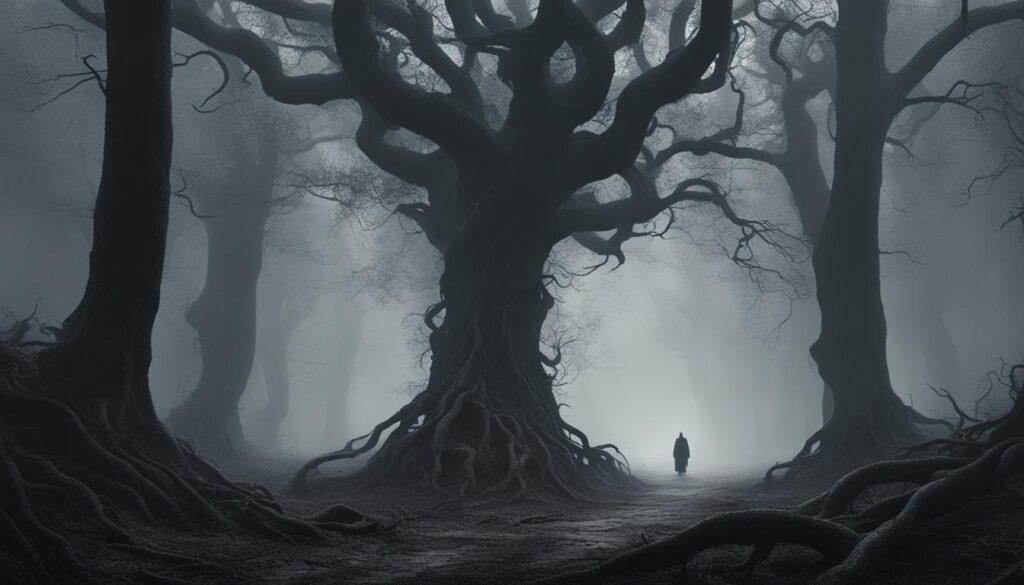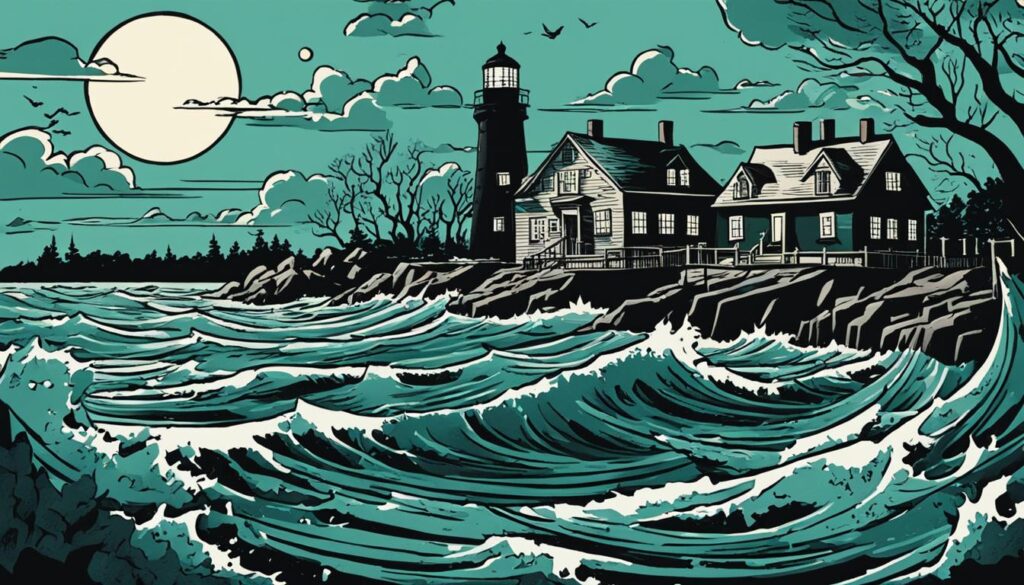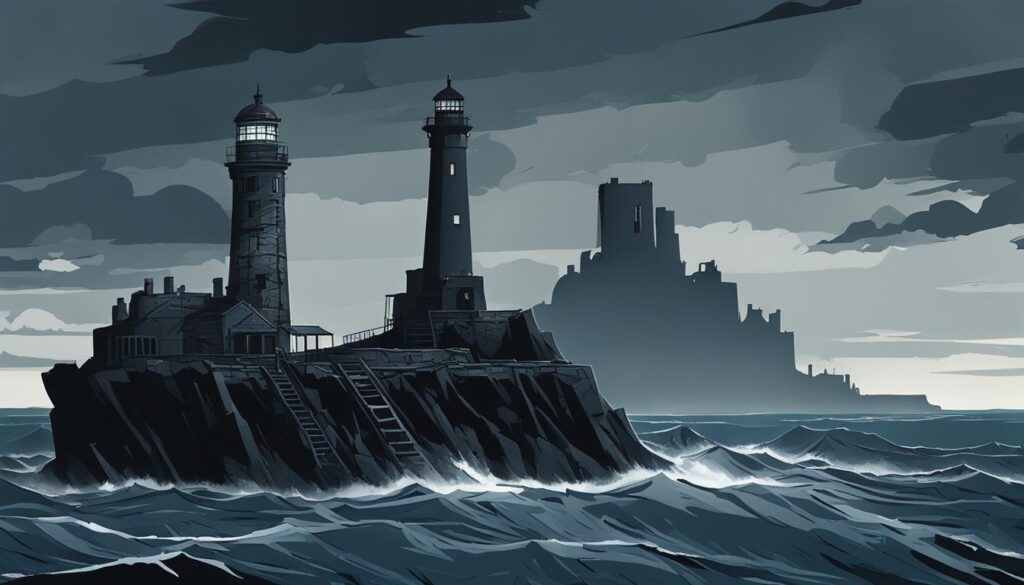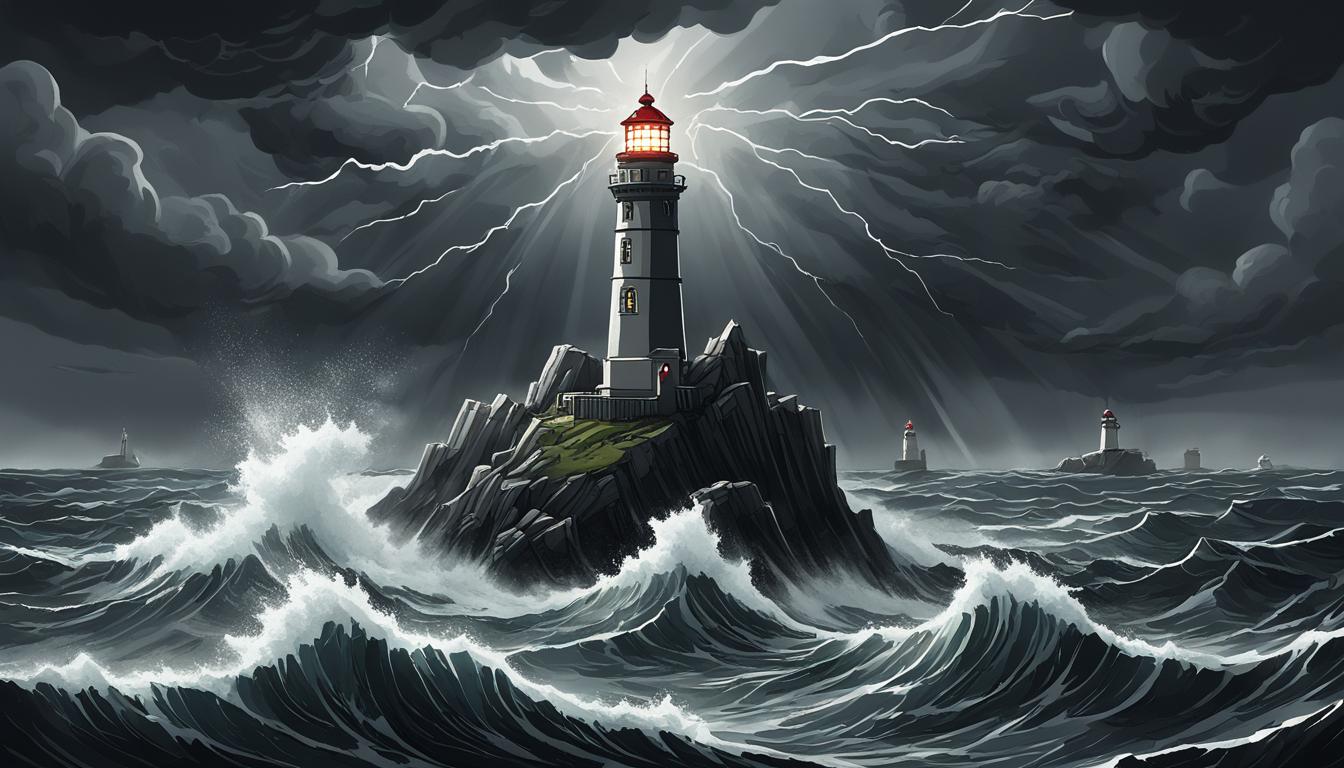Shutter Island, written by Dennis Lehane, is a captivating novel that takes readers on a thrilling journey through the twisted corridors of Ashecliffe Hospital for the criminally insane. Published in April 2003, this psychological thriller is known for its Gothic setting, psychological horror elements, and masterful storytelling by Lehane.
Key Takeaways:
- Shutter Island is a gripping psychological thriller written by Dennis Lehane.
- The story follows U.S. Marshal Teddy Daniels as he investigates the disappearance of a patient at Ashecliffe Hospital on Shutter Island.
- The novel explores themes of reality, identity, and the fragility of the human mind.
- Dennis Lehane’s atmospheric writing style, intricate plotting, and vivid characters immerse readers in the gripping world of Shutter Island.
- The book’s success led to a critically acclaimed film adaptation directed by Martin Scorsese and starring Leonardo DiCaprio.
Overview of Shutter Island
Shutter Island is a gripping psychological thriller set in 1954. The story revolves around Teddy Daniels, a U.S. Marshal tasked with investigating the disappearance of a patient at Ashecliffe Hospital, a facility for the criminally insane located on Shutter Island. In collaboration with his partner, Chuck Aule, Teddy uncovers a perplexing code within the patient’s room, leading them to suspect foul play beyond initial appearances. As they venture deeper into the enigma, they unravel sinister secrets and confront a conspiracy that shatters their perception of reality.
Shutter Island immerses readers in a dark and suspenseful narrative, exquisitely crafted by Dennis Lehane. With its intriguing plot, atmospheric setting, and complex characters, this novel remains a standout in the genre.
Historical Context of Shutter Island
Shutter Island takes place in the 1950s, a time when mental health treatments and institutions were undergoing significant changes. This historical context plays a crucial role in shaping the narrative and adding depth to the story.
During this period, mental health care was experiencing a shift towards new approaches, including the use of psychotropic drugs and experimental procedures. The novel explores these advancements and the ethical dilemmas that arise from them, highlighting the complexities of mental health care during that time.
The backdrop of the Cold War also influences the historical context of Shutter Island. The fear of Soviet brainwashing and manipulation adds another layer of tension and intrigue to the story, reflecting the broader societal anxieties of the era.
“The historical context of the 1950s allows Dennis Lehane to delve into the evolving field of mental health care and its ethical implications, while also capturing the atmosphere of fear and suspicion during the Cold War.”
By examining the historical context of Shutter Island, readers gain a deeper understanding of the challenges faced by mental health professionals and the impact of larger societal events on individuals’ lives.
Gothic Elements in Shutter Island
Dennis Lehane masterfully incorporates Gothic elements into his novel, Shutter Island, creating a dark and atmospheric setting that adds to the suspense and intrigue of the story.
The isolated location of the hospital on Shutter Island amplifies the sense of isolation and confinement, characteristic of Gothic literature. As the characters navigate the eerie and foreboding atmosphere, a sense of unease permeates the narrative.
Lehane draws inspiration from classic Gothic literature and films, weaving in elements such as mysterious disappearances and a pervasive sense of dread. These elements contribute to the Gothic atmosphere of the novel, keeping readers on the edge of their seats.
As the story unfolds, the layers of darkness and mystery deepen, creating a sense of foreboding and anticipation. Lehane’s vivid descriptions and skillful storytelling make Shutter Island a captivating read for fans of Gothic fiction.
Psychological Horror in Shutter Island
Shutter Island takes readers on a chilling journey into the realm of psychological horror. The novel explores themes of identity, memory, and sanity, plunging the protagonist, Teddy Daniels, into a harrowing web of uncertainty and fear.
As Teddy investigates the disappearance of a patient at Ashecliffe Hospital, he confronts his own traumatic past and grapples with the fragility of his sanity. A sense of impending doom pervades the narrative, keeping readers on the edge of their seats as they question what is real and what is imagined.
The psychological horror in Shutter Island lies not only in the suspenseful plot but also in the unsettling exploration of the human mind. Dennis Lehane deftly navigates the depths of Teddy’s psyche, blurring the lines between reality and illusion and leaving readers questioning their own perceptions.
Through a masterful blend of atmospheric descriptions, intense character development, and intricate plotting, Shutter Island immerses readers in a world of psychological terror. It is a testament to Lehane’s skill as a writer and his ability to create a haunting and thought-provoking tale.

“The scariest monsters are the ones that lurk within our souls.” – Edgar Allan Poe
Film Adaptation of Shutter Island
Shutter Island, the gripping novel by Dennis Lehane, was brought to life on the big screen in a film adaptation directed by Martin Scorsese and starring Leonardo DiCaprio.
The film, released in 2010, received critical acclaim for its atmospheric storytelling and the compelling performances of its cast. It successfully captured the essence of the novel while adding its own visual flair.
Scorsese skillfully translated Lehane’s suspenseful narrative into a haunting and visually stunning cinematic experience. DiCaprio’s portrayal of U.S. Marshal Teddy Daniels brought complexity and depth to the character, captivating audiences with his nuanced performance.
“The film adaptation of Shutter Island stays true to the dark and chilling atmosphere of the novel. Scorsese’s direction and DiCaprio’s performance take viewers on a gripping psychological journey, mirroring the tension and suspense of the original story.” – Film Critic
The film’s cinematography and production design further enhanced the sense of foreboding and isolation that permeates the narrative. The haunting visual imagery, combined with impeccable performances from the supporting cast, created a truly immersive cinematic experience.
Key Points:
- The film adaptation of Shutter Island directed by Martin Scorsese and starring Leonardo DiCaprio received critical acclaim.
- The movie captured the essence of the novel while adding its own visual flair.
- Scorsese’s direction and DiCaprio’s performance brought the suspenseful narrative to life.
- The film’s cinematography and production design enhanced the atmospheric and chilling tone of the story.
Reception and Impact of Shutter Island
Upon its release, Shutter Island garnered positive reception from both critics and readers alike. The gripping psychological thriller quickly established itself as a masterpiece in the genre, solidifying Dennis Lehane’s position as a master storyteller. Its haunting and suspenseful narrative captivated audiences, leaving a lasting impact on the literary landscape.
“Dennis Lehane has crafted an enthralling tale of suspense and psychological complexity. Shutter Island is a masterpiece that will keep you on the edge of your seat until the last page.” – The New York Times
The success of the novel paved the way for its film adaptation, directed by Martin Scorsese and starring Leonardo DiCaprio. The film introduced Shutter Island to an even wider audience, who were enthralled by the atmospheric storytelling and gripping performances.

The enduring popularity of Shutter Island has had a lasting impact on the psychological thriller genre, inspiring and influencing subsequent works. Its intricate plot, compelling characters, and thought-provoking themes have left an indelible mark on readers and continue to captivate new audiences.
Themes Explored in Shutter Island
Shutter Island explores multiple thought-provoking themes that delve into the nature of reality, the fragility of the human mind, the consequences of trauma, and the manipulation of perception. This gripping novel challenges readers’ perceptions and raises profound questions about identity and the search for truth.
- The Nature of Reality: Shutter Island invites readers to question what is real and what is illusion. As the story unfolds, the line between reality and fantasy becomes blurred, leaving readers uncertain of the true nature of events.
- The Fragility of the Human Mind: The novel explores the vulnerabilities of the human psyche, showcasing how easily the mind can be manipulated and deceived. It raises important discussions about mental health, vulnerability, and the impact of trauma.
- The Consequences of Trauma: Shutter Island delves into the lasting effects of trauma on individuals, highlighting the ways in which past experiences can shape one’s perception of reality. The characters grapple with their own traumatic pasts, illuminating the profound impact trauma can have on the human psyche.
- The Manipulation of Perception: Throughout the story, Shutter Island delves into the ways in which perception can be manipulated for various purposes. It poses questions about the morality of manipulating perception for personal gain or control, forcing readers to confront the power of deception.
Shutter Island’s exploration of these themes adds depth and complexity to the gripping narrative, creating a thought-provoking reading experience that lingers in the minds of its audience.
Writing Style and Technique in Shutter Island
Dennis Lehane’s writing style in Shutter Island captivates readers with its atmospheric descriptions, taut pacing, and intricate plotting. The novel’s unique and engaging narrative structure adds to its allure. Lehane expertly employs flashbacks and dream sequences, creating a sense of unease and suspense that keeps readers on the edge of their seats.
Lehane’s command of language and vivid imagery immerses readers in the mysterious world of Shutter Island. The carefully crafted prose brings the setting to life, evoking a sense of foreboding and darkness. Through his writing, Lehane skillfully conveys the psychological turmoil of the characters, enhancing the overall suspense and atmosphere of the story.
“Lehane’s writing style in Shutter Island is both captivating and haunting. The way he weaves together suspense and psychological depth keeps readers enthralled from beginning to end.” – Book Review
The nonlinear narrative structure of Shutter Island adds layers of complexity to the story, allowing readers to piece together the puzzle alongside the characters. The use of fragmented memories and shifting perspectives creates a disorienting effect, heightening the suspense and blurring the lines between reality and illusion.
Key Elements of Lehane’s Writing Style:
- Atmospheric descriptions that evoke a sense of foreboding and suspense.
- Taut pacing that keeps readers engaged and eager to uncover the truth.
- Intricate plotting that weaves together multiple storylines and reveals shocking revelations.
- Expert use of language and vivid imagery that immerses readers in the world of Shutter Island.
Lehane’s writing style and technique in Shutter Island contribute to its status as a gripping psychological thriller. By carefully crafting each sentence and utilizing narrative devices, Lehane creates a reading experience that is both captivating and thought-provoking.
Characters in Shutter Island
Shutter Island features a cast of complex and compelling characters. The protagonist, Teddy Daniels, is a haunted U.S. Marshal with a dark past. His partner, Chuck Aule, provides a contrasting presence, offering a more rational and grounded perspective. As Teddy investigates the disappearance of a patient, the other inhabitants of Shutter Island, both patients and staff, add to the mystery and unpredictability of the story.
Teddy Daniels
Teddy Daniels, a U.S. Marshal, is the central character in Shutter Island. Haunted by his own past, he is determined to uncover the truth behind the disappearance of a patient at Ashecliffe Hospital. As he delves deeper into the mystery, Teddy’s own sanity and perception of reality are called into question.
Chuck Aule
Chuck Aule, Teddy’s partner, provides a contrasting perspective throughout the story. He offers a rational and grounded voice, challenging Teddy’s beliefs and providing a balance to his haunted nature. Chuck’s presence adds depth to the dynamic between the two characters as they navigate the twists and turns of the investigation.
The Inhabitants of Shutter Island
The other inhabitants of Shutter Island, both patients and staff, contribute to the mystery and atmosphere of the story. Each character brings their own quirks, secrets, and unpredictability, keeping readers guessing as to their true intentions. They add layers to the narrative and heighten the suspense as the plot unfolds.
Symbolism in Shutter Island
Shutter Island employs symbolism to enrich its themes and provide deeper insight into the story. Symbolism serves as a powerful tool, allowing the author to convey complex ideas and emotions in a more evocative manner. In the case of Shutter Island, several symbols carry significant meaning, enhancing the reader’s understanding of the narrative.
Lighthouse: Symbol of Enlightenment
The lighthouse featured in Shutter Island symbolizes enlightenment and truth. It represents a beacon of hope and understanding that guides the characters through the darkness of their circumstances. The lighthouse serves as a metaphorical light in the midst of confusion and uncertainty, shedding light on the hidden truths that lie within the story.
Storm and Hurricane: Chaos and Upheaval
The storm and hurricane that occur in Shutter Island represent chaos and upheaval. As the story unfolds, the presence of these natural disasters intensifies the suspense and amplifies the sense of danger. The storm and hurricane reflect the turbulent inner world of the characters and the external forces that threaten to unravel their sanity and unravel the truth they seek.
Island: Metaphor for Isolation and Confinement
The island itself serves as a metaphor for isolation and confinement, both physically and mentally. The characters find themselves trapped on Shutter Island, cut off from the outside world. This isolation creates a sense of claustrophobia and heightens the tension within the story. Additionally, the island symbolizes the internal struggles and psychological barriers the characters must overcome as they navigate through their own personal demons.
The Legacy of Shutter Island
Shutter Island has left a lasting impact on the genre of psychological thrillers and cemented Dennis Lehane’s reputation as a masterful storyteller. The novel continues to captivate readers with its suspenseful plot, richly developed characters, and thought-provoking themes. It remains a favorite among fans of the genre and is often cited as one of Lehane’s best works.
With its atmospheric setting and intricate plotting, Shutter Island keeps readers on the edge of their seats, eagerly turning the pages to uncover the truth behind the mysteries of Ashecliffe Hospital. The story’s twists and turns, combined with Lehane’s skillful prose, have solidified its place in the literary pantheon.
Shutter Island’s legacy is not limited to the page. The 2010 film adaptation, directed by Martin Scorsese and starring Leonardo DiCaprio, further cemented the story’s place in popular culture. The haunting visuals and gripping performances brought the story to life on the silver screen, introducing a whole new audience to the dark and enigmatic world of Shutter Island.
For aspiring writers in the genre, Shutter Island serves as a shining example of effective storytelling. Its ability to create a sense of unease and keep readers guessing until the very end is a testament to Lehane’s mastery of suspense. The novel’s impact can be seen in the many psychological thrillers that have followed in its wake, drawing inspiration from its atmospheric setting, complex characters, and intricate plot.
Shutter Island’s legacy as a gripping psychological thriller is undeniable. It continues to captivate readers with its timeless appeal and remains a must-read for fans of the genre. Whether you’re delving into the mysteries of Ashecliffe Hospital for the first time or revisiting the story that left a profound impact, Shutter Island is a testament to the enduring power of a well-crafted psychological thriller.

Notable Quotes:
“Doubt can be a bond as powerful and sustaining as certainty. When you are lost, you are not alone.” – Dennis Lehane, Shutter Island
Shutter Island’s legacy is a testament to the enduring power of gripping storytelling and the fascination with the human psyche. The novel’s lasting impact on the genre is a testament to its ability to engage and captivate readers, cementing its place among the top psychological thrillers of all time.
Recommended Reading and Similar Books
If you enjoyed reading Shutter Island, you might also find these psychological thrillers and mystery novels intriguing. These books share similar atmospheric tension, gripping storytelling, and psychological depth found in Shutter Island:
- “Gone Girl” by Gillian Flynn
- “The Girl on the Train” by Paula Hawkins
- “The Silent Patient” by Alex Michaelides
These thrilling reads will keep you on the edge of your seat, just like Shutter Island.
Conclusion
Shutter Island is a must-read for fans of psychological thrillers and anyone who appreciates well-crafted storytelling. The novel takes readers on a gripping journey into the depths of the human mind, exploring themes of identity, memory, and the fragility of sanity. From its atmospheric setting on the isolated Shutter Island to its complex and compelling characters, Shutter Island keeps readers on the edge of their seats from start to finish.
With its masterful blend of Gothic elements and psychological horror, Shutter Island immerses readers in a twisted reality where nothing is as it seems. Dennis Lehane’s atmospheric descriptions and taut pacing make for a truly suspenseful reading experience. The novel’s impact has extended beyond the page, as it was adapted into a critically acclaimed film directed by Martin Scorsese and starring Leonardo DiCaprio.
If you’re looking for a thrilling and thought-provoking read, Shutter Island should be at the top of your list. Its captivating plot, richly developed characters, and thought-provoking themes make it a standout in the genre. So dive into the mysteries of Shutter Island and prepare to question everything you know about reality and the human mind.
FAQ
What is Shutter Island about?
Shutter Island is a novel written by Dennis Lehane and published in April 2003. It tells the story of U.S. Marshal Teddy Daniels as he investigates the disappearance of a patient at Ashecliffe Hospital for the criminally insane on Shutter Island.
When is Shutter Island set?
Shutter Island is set in 1954.
What are the themes explored in Shutter Island?
Shutter Island delves into several themes, including the nature of reality, the fragility of the human mind, the consequences of trauma, and the manipulation of perception.
Who are the main characters in Shutter Island?
The main characters in Shutter Island are Teddy Daniels, a U.S. Marshal, and his partner Chuck Aule. Other inhabitants of Shutter Island, both patients and staff, also play significant roles in the story.
Was Shutter Island adapted into a film?
Yes, Shutter Island was adapted into a film directed by Martin Scorsese and starring Leonardo DiCaprio. The film was released in 2010.
What is Dennis Lehane’s writing style in Shutter Island?
Dennis Lehane’s writing style in Shutter Island is characterized by its atmospheric descriptions, taut pacing, and intricate plotting. The novel employs a nonlinear narrative structure, utilizing flashbacks and dream sequences to create a sense of unease and suspense.
What impact has Shutter Island had on the genre?
Shutter Island has left a lasting impact on the genre of psychological thrillers and solidified Dennis Lehane’s reputation as a masterful storyteller. The novel continues to captivate readers with its suspenseful plot, richly developed characters, and thought-provoking themes.
Are there any other books similar to Shutter Island?
If you enjoyed Shutter Island, you may also like other psychological thrillers and mystery novels such as “Gone Girl” by Gillian Flynn, “The Girl on the Train” by Paula Hawkins, and “The Silent Patient” by Alex Michaelides.



